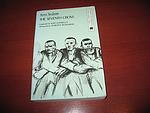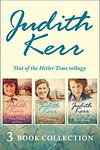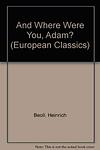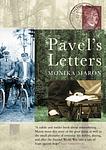The Greatest German "World War II" Books of All Time
Click to learn how this list is calculated.
This list represents a comprehensive and trusted collection of the greatest books. Developed through a specialized algorithm, it brings together 300 'best of' book lists to form a definitive guide to the world's most acclaimed books. For those interested in how these books are chosen, additional details can be found on the rankings page.
Genres
The category of "World War II" books encompasses a wide range of literature that focuses on the events, people, and consequences of the global conflict that took place between 1939 and 1945. This category includes historical accounts, memoirs, biographies, and fiction that explore the political, social, and cultural aspects of the war, as well as its impact on individuals and societies around the world. From the Holocaust to the Pacific theater, from the home front to the battlefields, "World War II" books offer readers a deep understanding of one of the most significant and devastating events in human history.
Countries
Date Range
Reading Statistics
Click the button below to see how many of these books you've read!
Download
If you're interested in downloading this list as a CSV file for use in a spreadsheet application, you can easily do so by clicking the button below. Please note that to ensure a manageable file size and faster download, the CSV will include details for only the first 500 books.
Download-
1. The Tin Drum by Günter Grass
The novel tells the story of Oskar Matzerath, a boy who decides on his third birthday that he will stop growing and remain a three-year-old forever. Oskar is gifted with a tin drum by his mother, which he uses to express his emotions and thoughts. Living in Danzig during the rise of Nazi Germany, Oskar's refusal to grow is a form of protest against the adult world. The book is a blend of magical realism and historical fiction, providing a unique perspective on the horrors of World War II and the post-war era in Germany.
-
2. The Book Thief by Markus Zusak
Set in Nazi Germany during World War II, the novel follows the story of a young girl who finds solace in stealing books and sharing them with others. In the midst of the horrors of war, she forms a bond with a Jewish man her foster parents are hiding in their basement. The story is narrated by Death, offering a unique perspective on the atrocities and small acts of kindness during this period. The girl's love for books becomes a metaphor for resistance against the oppressive regime.
-
3. Eichmann in Jerusalem: A Report on the Banality of Evil by Hannah Arendt
This book is a thought-provoking exploration of the trial of Adolf Eichmann, a major organizer of the Holocaust. The author argues that Eichmann was not a fanatical ideologue, but rather an ordinary individual who simply followed orders and bureaucratic procedures, highlighting the terrifying potential for evil in any system that values obedience over personal responsibility. The concept of the "banality of evil" is introduced, suggesting that horrific acts can be committed by ordinary people under certain conditions.
-
4. The German Lesson by Siegfried Lenz
"The German Lesson" is a vivid exploration of the moral and cultural conflicts of World War II, set in a small German village. The story is narrated by a young boy who is tasked by his school teacher with an assignment to write an essay on "The Joys of Duty." As his father, a local police officer, is assigned the duty of preventing a popular local artist from painting, the boy finds himself torn between his father's rigid adherence to duty and his own growing appreciation for art and individual expression. The narrative grapples with themes of duty, obedience, and the power of art, providing a thoughtful examination of life under the Nazi regime.
-
5. Jacob the Liar by Jurek Becker
Set during the Holocaust in a Jewish ghetto in Poland, the novel revolves around a man named Jacob who fabricates the news of the Russian Army's advancement to uplift the spirits of his fellow prisoners. However, as his lies gain traction, they become a beacon of hope for the desperate people in the ghetto, leading to unforeseen consequences. The book explores themes of hope, despair, and the power of words, ultimately questioning the morality of lying for a greater good.
-
6. The Seventh Cross by Anna Seghers
"The Seventh Cross" is a gripping tale set in Nazi Germany that revolves around seven men who escape from a concentration camp. The camp commandant erects seven crosses, vowing to hang each escapee on their return. The story primarily follows one escapee, who manages to evade capture and make his way back to his hometown. The narrative explores the psychological terror imposed by the Nazi regime, the resilience of human spirit, and the subtle forms of resistance within the German populace.
-
7. Transit by Anna Seghers
A German man escapes from a Nazi concentration camp during World War II and finds himself stuck in Marseille, France, where he assumes the identity of a deceased author to secure a transit visa. As he navigates the bureaucratic maze of the immigration process, he becomes entangled in the lives of the refugees around him, including a desperate woman searching for her missing husband, the very man he's impersonating. The novel explores themes of identity, displacement, and the human struggle for freedom.
-
8. When Hitler Stole Pink Rabbit by Judith Kerr
"When Hitler Stole Pink Rabbit" is a poignant and autobiographical novel that follows the life of a young Jewish girl named Anna and her family as they flee Germany in the 1930s to escape the rise of the Nazi regime. Through Anna's eyes, the book explores the challenges and hardships faced by refugees, as well as the loss of identity and sense of belonging. It is a touching story of resilience, courage, and the power of family bonds in the face of adversity.
-
9. And where Were You, Adam? by Heinrich Böll
This novel is a collection of interconnected short stories set during World War II, providing a vivid portrayal of the human costs of war. The narrative follows various characters including soldiers, civilians, and victims of war, each offering different perspectives on the realities of war. It explores themes of loss, survival, and the moral ambiguities of war, highlighting the author's anti-war sentiments.
-
10. Pavel's Letters by Monika Maron
"Pavel's Letters" is a poignant narrative that explores the personal journey of a novelist who uncovers her family's past in war-torn Poland. After receiving a collection of letters from her grandfather, Pavel, the protagonist delves into the history of her family, their experiences during World War II, and the hardships they faced under Stalin's regime. The book is a compelling blend of personal memories, historical facts, and the exploration of the human spirit's resilience in the face of adversity.
-
11. The Blind Side of the Heart by Julia Franck
"The Blind Side of the Heart" is a historical novel that explores the life of a German woman before, during, and after World War II. The story begins with her abandonment of her young son at a railway station, then flashes back to her own childhood, her experiences during the war, and her tumultuous relationships. The narrative provides a deep and unflinching look at the psychological effects of war and the struggle for survival, as well as the profound impact of trauma and loss.
Reading Statistics
Click the button below to see how many of these books you've read!
Download
If you're interested in downloading this list as a CSV file for use in a spreadsheet application, you can easily do so by clicking the button below. Please note that to ensure a manageable file size and faster download, the CSV will include details for only the first 500 books.
Download









